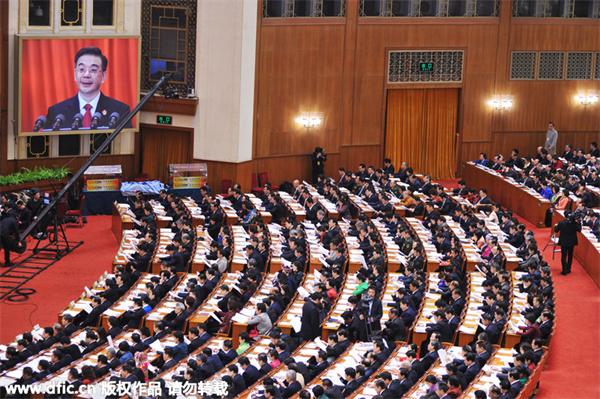More steely resolve for judicial reform
Updated: 2015-03-13 10:23
(China Daily)
|
|||||||||||
 |
|
China's Chief Justice Zhou Qiang delivers the work report of the Supreme People's Court (SPC) to the national legislature at the ongoing annual session. [Photo/IC] |
The Supreme People's Procuratorate and Supreme People's Court may get better-looking ratings this year when their work reports are presented for voting at the National People's Congress, as each has something impressive to report.
Most noticeably, the former investigated more than 14,000 public servants for bribe-taking, the latter corrected more than 1,300 court rulings through retrials, including several sensational miscarriages of justice.
These are certainly signs of progress. And they will surely add to public confidence in the rhetoric about the rule of law.
But the road to the kind of justice President Xi Jinping wants people to feel "in every case" remains long and tortuous, not least because these were not achieved on their own initiative. In a certain sense, they were natural by-products of the rectification campaign that is sweeping public offices.
Not that there was no progress on the judicial front. The idea of selling "assumption of innocence" to a broader audience inside the judicial system, for one, was a laudable endeavor to update the judicial way of thinking, particularly at the grassroots.
So the judicial sectors should concentrate on creating something truly impressive of their own making this year, and in the years to come. Whether or not they can make that happen, however, rests entirely on their ability to guarantee the latest judicial reform blueprint is executed as it is supposed to be.
For average citizens, having justice done, especially when a dispute involves a public office or official, can be a costly mission. The rule of law remains a mere ear-pleasing slogan because public office-holders continue to take the law as a tool to suit themselves.
In real life, the procuratorate and court are treated as just two other departments of the government. Prosecutors and judges, therefore, are taken as just bureaucrats on budget payroll. They depend on local administrators for normal functioning. There is no way they are not vulnerable to administrative intervention.
But ordinary people simply want the judicial system to be fair and just.
Many of the pilot projects on the judiciary's agendas promise to deliver substantial differences. The establishment of circuit courts, as well as the "de-bureaucratization" of judges, will all contribute to the judiciary's struggle to get rid of the current credibility crisis.
The key to success, however, lies in making sure every step forward is solid and down-to-earth.
Related Stories
Strong opinions on ending judicial errors 2015-03-12 18:35
Achievements made in building transparent judicial system 2015-03-10 20:30
China issues white paper on judicial transparency 2015-03-10 18:43
Xi asks party organs to support independent judicial system 2015-01-20 20:11
Today's Top News
China likely to ease again if inflation falls: insider
Reproach for wrongful convictions
China's two universities make top 50
Astronauts return from space station
Italian court upholds Berlusconi's acquittal
UK companies seek new opportunities in China
CNR, CSR merger passes overseas antitrust scrutiny
Official urges Dalai Lama to forsake evil ways
Hot Topics
Lunar probe , China growth forecasts, Emission rules get tougher, China seen through 'colored lens', International board,
Editor's Picks

|

|

|

|

|

|





